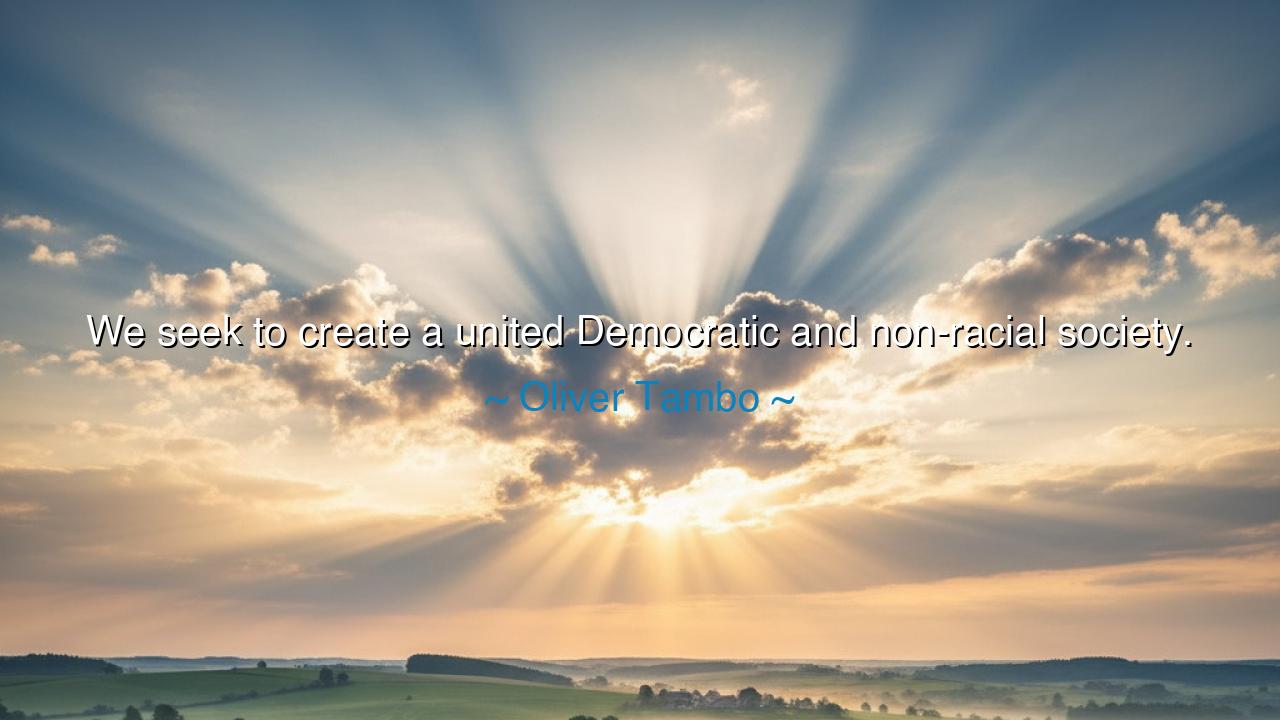
We seek to create a united Democratic and non-racial society.






The words of Oliver Tambo, “We seek to create a united Democratic and non-racial society,” resound like a trumpet call across the valleys of history. Spoken in the crucible of apartheid South Africa, when injustice reigned as law and division was the daily bread of the oppressed, these words were not gentle philosophy but a weapon forged in hope. They reveal the vision of a man who, though exiled from his homeland, carried in his heart the dream of a nation reborn—not fractured by hatred, but united, not governed by tyranny, but Democratic, not scarred by the chains of race, but non-racial and free.
The origin of this proclamation comes from Tambo’s role as president of the African National Congress (ANC) during its years in exile. While Nelson Mandela languished in prison, Tambo carried the cause abroad, rallying nations, movements, and ordinary people to support the struggle against apartheid. His declaration was not mere rhetoric but a compass: the ANC would not seek revenge, nor replace one tyranny with another, but would fight to build a South Africa where every person—Black, White, Indian, Coloured—could walk as equals beneath the sun. In these words lies the blueprint of reconciliation before reconciliation was ever achieved.
History gives us many examples of nations torn between division and unity. Consider the end of the American Civil War. Though slavery was abolished, the society that emerged was not fully united, nor truly non-racial. Segregation, violence, and injustice continued for generations. Contrast this with South Africa’s path in the 1990s, when leaders like Tambo and Mandela laid the groundwork for the Truth and Reconciliation Commission. They sought not only to end apartheid but to heal the wounds it caused. This, too, was the fruit of Tambo’s vision: that freedom without reconciliation would be fragile, but freedom with unity could endure.
The meaning of Tambo’s words is thus greater than South Africa alone. They declare a universal truth: that no society can call itself whole while it is divided by race, by class, or by hatred. True democracy does not belong only to the majority, but to every soul who lives within the nation’s borders. True unity is not the silencing of difference, but the harmony of differences joined in common purpose. And true greatness is not found in conquering others, but in creating a community where all can flourish side by side.
His words are also a challenge. It is easy to speak of democracy, but harder to ensure that every voice is heard. It is easy to proclaim equality, but harder to uproot the subtle prejudices that linger in hearts and institutions. It is easy to celebrate unity in times of triumph, but harder to sustain it in times of fear. Yet Tambo, speaking from exile, knew that the struggle was worth it—for the alternative was endless division, endless violence, and the destruction of the nation’s soul.
The lesson for us today is clear: wherever you dwell, seek to build a united, Democratic, and non-racial society. In your workplace, in your neighborhood, in your nation, do not tolerate the poison of discrimination or the cancer of division. Lift the voices of those who are silenced, extend the hand of fellowship to those excluded, and remind all that the destiny of a people is bound together. For if one is chained, none are free; if one is silenced, none can truly speak.
Practical actions flow from this wisdom. Teach children the dignity of all peoples, not merely in word but in daily example. Support institutions and leaders that honor inclusivity rather than exploit division. Challenge prejudices where you encounter them, not with hatred but with courage and truth. And in your own heart, cultivate the discipline of seeing every human being as kin. For the work of unity is not the task of leaders alone, but of every citizen who dares to live by justice.
Thus let Oliver Tambo’s words endure as both vision and vow: to create a society united in purpose, Democratic in spirit, and non-racial in soul. This is the path not only for South Africa, but for all nations that would call themselves free. It is a high calling, a difficult road, but also the only road that leads to peace. Let future generations remember: division is easy, but unity is eternal; hatred destroys, but justice endures. And in walking this path, humanity itself shall rise.






AAdministratorAdministrator
Welcome, honored guests. Please leave a comment, we will respond soon